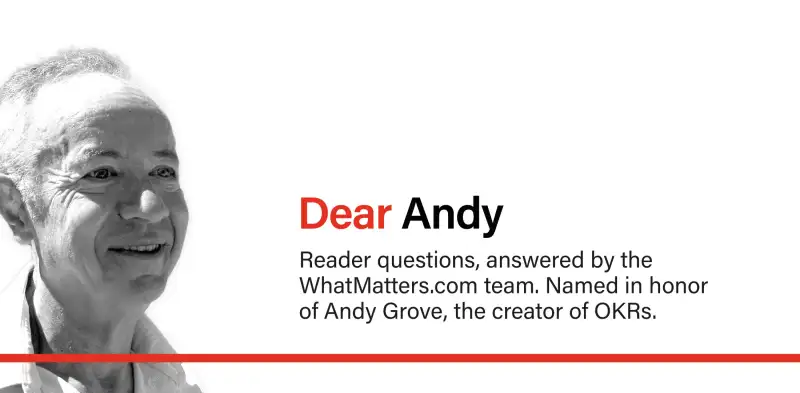Dear Andy,
We use OKRs to focus on the highest priorities for the company. In parallel, we have our yearly Objectives broken down to department Objectives and project road maps. One common criticism I hear is “whatever other yearly Objectives we don’t put into our OKRs this quarter will need to go into OKRs for the next quarter, since those Objectives and projects are lacking attention.”
How do we avoid this “yo-yo effect” of moving to one priority for a quarter, then to the neglected project (which becomes a priority), then back to the first neglected Objective (which once again becomes a priority) in the next quarter?
Sincerely,
Domenic

Hi Domenic,
The “yo-yo effect” you’re describing likely stems from setting OKRs that aren’t being met by the end of the quarter. This is common, but if your policy is to immediately shift focus to unfinished priorities from the previous quarter — whether the current OKRs are on track or not — you risk creating confusion and frustration among your team.
To avoid this, I recommend including Committed OKRs in your next goal-setting session. Committed OKRs are non-negotiable and must be fully achieved within the quarter to be considered a success. I suspect you may be using their counterparts, Aspirational OKRs, which are ambitious goals that often roll over from quarter to quarter. Committed OKRs require a clear finish line and for the team to remain focused so they can be checked off.
When you meet your Committed OKRs, fantastic! You can move on to other priorities. If you miss a Committed goal, it’s time to talk. If the goal is still mission critical, revisit the Key Results and how you’ll allocate resources to achieve them. Then, decide if something new or something that had been previously deprioritized serves the company better. Which one will get you closer to achieving your organization’s top-level OKR?
OKRs are designed to channel attention and resources. Constantly shifting between past and present goals can create confusion and disrupt the flow of progress. Don’t swing to others because it’s a new quarter. In football, you keep your best players on the field in a close game (avoiding burnout). Same here. And if you have an OKR that keeps getting put in the parking lot, have a discussion with the leadership team about where the initiative fits in. You may find out it’s not the priority you think it is, or that they didn’t realize it’s the priority you know it is. Either way, you both win.
Thanks for writing in, Domenic, and best of luck to you and your team on your OKR journey.
Sincerely,
Billy from the What Matters Team




